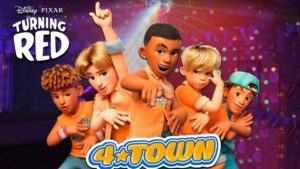Turning Red and the Power of the Boy Band
The year is 2011. A young kid has just heard about a new band named “One Direction” that all the girls in school won’t stop freaking out about and all the boys won’t stop calling stupid. Curious, they watch the music video for “What Makes You Beautiful” on the family computer after school. The song is pretty catchy, but that’s not what they’re really focused on. One of the members of the group is immediately alluring. He has dark, styled hair. He has gauges in his ears. He’s less expressive than the other four. He’s a bad boy.
He’s dreamy.
That young kid was me, having one of my first experiences having a crush on another person. The person in question? Zayn Malik of One Direction. I would be embarrassed by it being a member of a boy band, but I know I’m not alone. Countless others have shared stories of one of their first crushes as a middle schooler being toward a member of a similar group. One of the people who have gone on record as having such an experience is Domee Shi, animator and director at Pixar Animation. This experience was the basis for a large portion of the story of her newest movie Turning Red.
In the movie, the main character Meiling is a young girl who suddenly finds herself turning into a red panda whenever she feels overly emotional. This is an issue for several reasons, but to her the most obvious is that it interferes with the upcoming concert of her favorite boy band, 4*Town.

Considering aspects such as the asterisk in the name and the outfits being worn by the members, it’s clear the fictional band is meant to mostly take inspiration from boy bands of the late 90s and early 2000s such as N*Sync and the Backstreet Boys. However, considering the presence of groups such as the aforementioned One Direction and 5 Seconds of Summer in the early 2010s, and the more modern rise of k-pop groups, the boy band sensation is one that is still clearly felt to this day. But what makes it so effective?
Well, there’s of course the cynical answer. In the movie, each member of 4*Town is defined entirely by one singular character trait. There’s the goofy one, the sporty one, the sensitive one, the older one, and the handsome one. And as each girl reveals their favorite and why, the movie unravels just how artificial the entire system is. For example, Mei’s friend Miriam has a crush on Aaron T, the prankster of the group, solely because he’s the most “boyish” of the group, and she sees herself as a tomboy. Each of the band members’ character traits is designed specifically to take advantage of the emerging romantic tastes of young girls and trick them into thinking the performers in the band are actually the boys of their dreams. This is obviously similar to actual boy bands, who rely heavily on simple characteristics and personality traits to quickly win over their young audience. But as the movie also shows, boy bands can have a genuine positive effect on their young audience.
It’s no mistake that the climax of the movie in which the main character Meiling finally stands up to her mother takes place at a 4*TOWN concert. Despite how artificial the boy band system may be, the decision to go to the band’s concert rather than attend a ritual with her mother is an extremely important one. This moment symbolizes her growth as a character from a child caring solely about doing what her family tells her to a fully realized individual chasing her own wants and desires. Identifying with the band’s (admittedly very cheesy) music and fantasizing over the frontman Robaire gives her one of the first insights into her own tastes and interests and is one of the main driving forces behind her disobeying her mother for the first time. As cynical by design as the one trait members of boy bands may be, it also allows young girls (and clearly some others) a desire to latch onto and call their own. While my aforementioned crush Zayn Malik may not have been for any deeper reason than “I think the fact that he looks mysterious is hot”, it still was the start of me figuring out my own sexuality and romantic desires. However, while it would be nice if the conversation ended there, there is unfortunately a heavy stigma attached to boy bands.

As I mentioned at the beginning, most of the boys at my school wouldn’t stop talking about how dumb One Direction was, and they weren’t alone. You can look online and find several instances of many people hating on them and similar artists as well as their fans, with even going to disturbing levels (TW for discussion of self-harm). In Turning Red itself, Mei’s own mother criticizes the band and asks why anyone would want to see them and their “gyrating hips.” While the sheer amount of hatred many have for boy bands and their fans seems odd at first, it starts to make some more sense when you look at other pieces of pop culture that have received similar treatments. The Twilight novels, which also have a mirror in the movie through the Nightfall books read by character Priya, were another product aimed at young girls that received visceral hatred by those outside of that group. Unfortunately, the truth is that the things enjoyed by young girls and similar groups trying to figure out their identity are often looked down upon for the simple reason that those groups themselves are equally looked down upon by many within our society. Turning Red itself has even been the subject of this, with many seemingly very upset about the idea of a movie even discussing topics such as periods and a young girl becoming more independent. Clearly even in 2022 the concept of media for young girls is still seen as inherently lesser.
And yet while it would be easy for the people who enjoyed these groups when they were younger to give in to the disapproval of others and disavow their earlier interests, many have continued to cherish their time as a member of these fan groups and look back at them fondly. Whether it be YouTube videos compiling some of their favorite moments of a group’s time together, or highly anticipated reunion tours, it is clear that even in their later years, many people who were fans of these groups continue to cherish the impact they had on them during a strange time in their lives. I know I certainly do.

